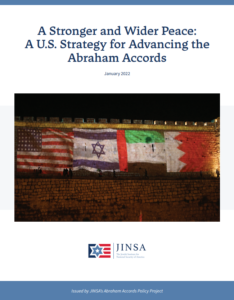A Stronger and Wider Peace: A U.S. Strategy for Advancing the Abraham Accords
The normalization agreements that the United States brokered between Israel and four Arab states – the United Arab Emirates (the UAE), Bahrain, Morocco, and Sudan – represent a major inflection point in the history of the modern Middle East. Struck in rapid succession over the final months of 2020, the Abraham Accords have the potential to shift the region’s strategic trajectory in ways overwhelmingly favorable to U.S. national security. These agreements hold out the prospect of ending the persistent conflict between Israel and a group of pragmatic Arab states, which since the early days of the Cold War has regularly frustrated Washington’s ability to establish an effective multinational framework for safeguarding vital U.S. interests in the Middle East.
Realizing their full potential will entail continued and concerted American leadership, both to help deepen ties among the members of the Accords, especially in the defense sphere, and to expand the agreements to include other pivotal regional actors – in particular Saudi Arabia. The Jewish Institute for National Security of America (JINSA) convened the Abraham Accords Policy Project and this task force – comprised of leading retired senior American military officers and national security officials with deep Middle East experience – to understand and articulate how U.S. policies can capitalize on these historic developments to encourage further progress that will strengthen regional stability, boost America’s waning global influence, and ultimately leave it better positioned to compete against the growing strategic challenges posed by China, Russia, and Iran. As part of their research and deliberations, members of the task force conducted an extensive, high-level fact-finding mission to Bahrain, Israel, and the UAE in the fall of 2021, with a special focus on examining new possibilities created by the Accords for building defense cooperation and military-to-military ties.
This comprehensive report is intended to provide in-depth analysis and recommendations to help inform the work of American decision makers, both in the Biden administration and Congress, as well as the broader policymaking community and public. Its first section identifies the factors, both long-term and proximate, that made the Accords possible, and details some of the remarkable and unprecedented cooperation they have already spurred in the realms of diplomacy, trade, culture, and even defense. The second section contains the group’s key findings, anchored around the vital importance of sustained U.S. leadership and support for consolidating and widening the Accords, including taking full advantage of the multinational framework provided by U.S. Central Command (CENTCOM) and Israel’s recent integration into its area of operations. In laying out a menu of policy prescriptions that range from less controversial low-hanging fruit to more ambitious, complex, and even transformative initiatives, the third and final section of the report emphasizes how the Executive Branch and Congress should maintain attitudes of flexibility and opportunism to seize upon the many strategic breakthroughs made possible by these landmark agreements.
Abraham Accords Policy Project Members
General Kevin Chilton, USAF (ret.) – Former Commander of U.S. Strategic Command and former Commander of U.S. Air Force Space Command
Vice Admiral Kevin Donegan, USN (ret.) – Former Commander of U.S. Navy Central Command and former Commander of U.S. Fifth Fleet
Ambassador Eric Edelman – Counselor at JINSA Gemunder Center for Defense & Strategy and former Under Secretary of Defense for Policy
Vice Admiral Mark Fox, USN (ret.) – Former Deputy Commander of U.S. Central Command, former Commander of U.S. Navy Central Command and former Commander of U.S. Fifth Fleet
The Honorable Mary Beth Long – Former Assistant Secretary of Defense for International Security Affairs
General Joseph Votel, USA (ret.) – Former Commander of U.S. Central Command and former Commander of U.S. Special Operations Command
General Charles Wald, USAF (ret.) – JINSA Distinguished Fellow, former Deputy Commander of United States European Command and former Commander of U.S. Air Forces Central Command
Admiral Paul Zukunft, USCG (ret.) – Former Commandant of U.S. Coast Guard
